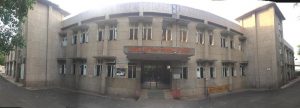History

Dewas became a Civil District in 1970. Earlier, Dewas District Court used to function in old court building from 1947 to 1996. Not only District Court but revenue courts and collector office was situated in such old building situated at Agra-Bombay Road presently, collector office and revenue court are working in such old Court building near to Sayaji Dwar, Dewas.
In 1996, the Dewas District Court was shifted to new building and thereafter District Court (Headquarter) is in continue function in present building. Dewas (Headquarter) District court building was constructed and handed over to District courts in the year 1996 and presently 13 Judicial officer i.e District & Session Judge, 4 Additional District Judges & 8 Magistrates are holding their respective courts. Sh. B.B. L. Srivastva was the first District Judge of Dewas during the years 1969-73.
The case titled State of MP Vs. Saranam Singh & other 1993 is a very famous case of honour killing decided in Dewas District, in which 7 family members were killed by accused persons. The Court of Sh. S.K. Jain, District Judge, Dewas had awarded death sentence to accused Saranam Singh & Shivraj Singh.
Sh. A.S. Patwardhan Advocate (Vidhan Sabha Speaker in Madhya Bharat) was the renounce and prominent lawyer of Dewas District Courts. Sh. D. S. Patwardhan & Sh. Babu Rao Sharma though were not law graduates but they were honoured with the title of Advocate by the then state. They were in regular practice for their entire life being an advocate and provided their valuable services to the community. Beside the others, Sh. Dhiraj Singhji Solanki was known and eminent lawyer and MLA of District Dewas.
There is full fledged mediation center is existed and functioning in District Courts Dewas where the litigant are getting cordial and co-operative atmosphere to resolve their dispute by way of mediation. Moreover, the Legal Aid Services are also operating from the same building to the weaker sections of the society who are not able to engaged lawyers to get justice just because of their poor economic conditions.



